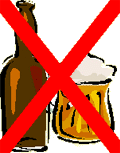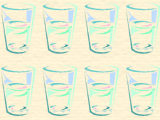|
Once the symptoms of an acute attack of gout have subsided (spontaneously or with drug use), treatment aimed at the prevention of further attacks should be started. Factors that predispose to high serum urate concentrations and gout include:
 |
family history |
 |
obesity |
 |
kidney failure |
 |
high blood pressure |
 |
diet high in purines |
 |
alcohol |
 |
diuretic drugs, aspirin |
 |
diseases causing cell breakdown |
 |
lead poisoning. |
Although none of these factors on its own may be the cause of high serum-urate levels, modification to lifestyle may help to reduce gouty attacks. For many patients, however, it will be necessary to control urate levels by long-term medication. As this may need to be lifelong, some patients may simply prefer to treat the attacks when they occur.
 Medication Medication |
Medication is usually recommended in patients with:
 |
recurrent attacks of gout |
 |
tophi formation |
 |
kidney complications |
 |
a family history of gout, especially with complications |
 |
an inability to maintain normal urate levels by a change in lifestyle. |
If preventive therapy is needed, it can be accomplished in two ways:
 |
by inhibiting the production of uric acid with allopurinol, or |
 |
by increasing the urinary excretion of uric acid with a uricosuric agent. |
Whichever method is used, treatment should not be started until three weeks after the acute attack of gout has subsided.
Allopurinol
Allopurinol is the most commonly used drug for long-term prevention of gout. It is convenient and has few side-effects. It acts by preventing the formation of uric acid from its purine precursors, decreasing levels of urates in the serum and urine, and prevents urate crystals forming in the kidney. It is especially useful for patients who produce too much urate or who have kidney stones or kidney failure.
When therapy is started, acute attacks of gout can occur. The reason for this is not clearly understood, but NSAIDs or colchicine are usually given concurrently for the first few months to avoid such attacks. Allopurinol can occasionally cause a rash, but tolerance usually develops.
Uricosuric agents
Drugs which increase the excretion of uric acid (uricosurics), such as benzbromorone, probencid and sulphinpyrazone, are used if allopurinol cannot be tolerated. Their use is contra-indicated, however, in patients who produce excess uric acid, in kidney failure and in patients with urate stones in the kidney. As with allopurinol, an NSAID or colchicine needs to be given concurrently at first to avoid gouty attacks.
Uricosurics increase the risk of urate crystal formation in the urine (with subsequent formation of kidney stones and loss of kidney function) and should be taken with plenty of water. They can also cause gastro-intestinal upsets and skin rashes. Aspirin must not be taken with uricosuric agents as it interferes with the excretion mechanisms.
Dietary Control
Diet is undoubtedly a contributory factor to high serum-urate levels and modification is important in the prevention of attacks of gout. An attempt to reduce:
 |
obesity |
 |
excess alcohol intake (especially of beer, port and some wines) |
 |
foods high in purines |
should be undertaken by all gout sufferers.
| Purine-high foods to be avoided or eaten in moderation |
 |
Red meat: especially beef, mutton, blood pudding (sausage), pheasant, venison and meat extracts |
 |
Offal: liver, kidney, tripe, tongue and heart |
 |
Legumes: beans, peas, lentils and soybeans |
 |
Certain other vegetables: including whole grains, asparagus, spinach, mushrooms and cauliflower |
 |
Some fish: especially sardines, salmon, herring, anchovies, mussels, oysters, scallops, lobster and crab |
|
Unless contra-indicated, plenty of water should be taken to flush uric acid through the kidneys. If lifestyle modifications alone are insufficient to ward off attacks, compliance with long-term therapy offers the best chance of avoiding gouty arthritis and the potential damage caused by tophi. |
| |
|
|
There is no cure for gout. The therapeutic aim is to focus on symptom relief and to control the progress of the disorder. The following measures help to prevent attacks of gout:
 |
Dietary control: eat a balance diet and avoid eating animal organs, bean products and fermented food such as preserved salty fish. |
| |

Certain foods should be avoided |
| |
|
 |
Abstain from drinking alcohol. |
| |

Abstain from alcohol |
| |
|
 |
Maintain moderate body weight. |
| |

Maintain health with exercise |
| |
|
 |
Try to avoid the risk factors of gout, such as stress, over-tiredness, low body temperature and accidents that may damage joints. |
| |
|
 |
Drink plenty of water to encourage the excretion of toxins. |
| |

Drink eight glasses of water per day |
| |
|
 |
Western medicine taken for the condition should be on advice of a doctor. Both TCM and Western doctors should be informed of all the therapies being used to relieve gout symptoms. |
| |
|
 |
Individuals with a family history of gout should undergo regular check-ups as they may be predisposed to the disorder. |
| |

Regular checkup |
|
Dietary measures
From the TCM viewpoint, both food and drugs come from the same source and food can vary in character. This means that food can promote health or have an adverse effect on it. In TCM, dietetic restraint is urged, meaning that some foods should be avoided in certain disorders or while certain medicines are being taken. For example, intake of salty food should be limited in edematous patients and a greasy diet avoided in cases of diarrhea. In gout, it is bean products, red meat, offal and fermented and salty foods that should be avoided.
|
| |
|